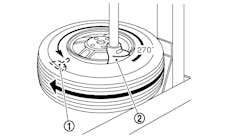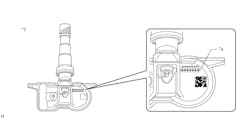Denso Corp. unveiled Vehicle MRI, a mobile app inspection tool designed to help identify underperforming parts and save time by automating numerous tasks, at the 2019 Automotive Aftermarket Products Expo (AAPEX).
The company says Vehicle MRI recommends parts and services that may have otherwise been missed and makes predictive maintenance recommendations based on the possibility of future parts failures. The app automates tasks such as checking for out-of-date software, open recalls and technical service bulletins related to the vehicle, as well as performing battery checks.
Currently Vehicle MRI is available for Android smartphones and tablets with plans to add IOS. Vehicle MRI works on all OBD2 makes and models since 1996.
Vehicle MRI adds a predictive maintenance element that is currently not available to shops, according to Denso. This added dimension helps repair shops improve sales and helps vehicle owners drive safer vehicles.
The Vehicle MRI app is designed to be a complement or a supplement to a visual inspection, according to Frank Choi, business and product development manager for Denso Connected Services. Choi told Modern Tire Dealer that the idea is take care of small problems before they become bigger ones.
“More often than not, when a call comes in for routine service, those vehicles usually come in without drivability issues. A technician most likely will walk around the vehicle to do a visual inspection.”
The technician checks fluid levels, brake material on the pads, and tire tread wear.
“They are making recommendations based on visual items,” says Choi. “Vehicle MRI allows a technician to plug into a vehicle and see what the vehicle is doing from the inside out. It is going to read all the data off the available computers and compare it to known good specifications that we have hosted in the cloud.”
Denso updates its cloud database and does not pass along charges to the end user. “In other words, there are free updates,” says Choi. Vehicle MRI generates reports that can be printed for the vehicle owner or sent via email as a PDF or as as a text message.
“In a nutshell, Vehicle MRI is designed to help save time for a technician. In addition to checking for DCTs, it’s also going to check the vehicle’s cranking voltage and check for out of date software as well as for safety recalls. All of those individual processes, if performed by themselves, could be overwhelming for a technician given the number of vehicles they see on a daily basis. If we can automate that, we can standardize it so it will be the same consistent test over and over again. It will give the service advisor or the technician an opportunity to recommend additional parts or services based on the findings.”
Choi says more information is available at the website, www.vehiclemri.com. The app will be released in the first quarter of 2020. It will be free to download from the Google Playstore and a subscription will be required.
Shops using Vehicle MRI saw a 15% increase in parts sold, a 14% increase in labor charges and a 12% increase in repair orders during Denso’s two-year test market study.
Vehicle MRI requires Denso’s OBD2 interface device be plugged into the vehicle. The company’s proprietary software does an inspection of all available systems providing OEM level diagnostics and data. A typical scan performs more than 400 tests and takes between one and five minutes to complete. The data is analyzed and a report appears on the customers mobile device and is available to print, email or text for customer approval.
The company’s technology investments also include significant improvements to its Denso Connect Customer Service Portal to simplify the parts ordering process. The improved website will be available in January 2020.
Denso expanded its product lines in 2019, adding 130 new part numbers for starters and alternators, 75 new part numbers for compressors, 60 new part numbers for oxygen sensors, 95 new part numbers for radiators and 36 new part numbers for condensers. Ignition coil coverage is at 93% of the market and filter sales increased 50% in 2019 versus 2018.



